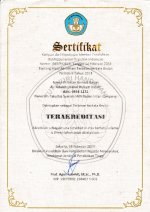Judges Decisions of Makassar, Palopo, and Masamba Religious Court over the Islamic Inheritance Law
Abstract
This study analyzes the results of ijtihad among the judges of the Religious Courts, particularly in the Palopo, Masamba, and Makassar Religious Courts in resolving cases of disputes over the inheritance rights of boys and girls in the Muslim community. Its main purpose is to analyze their method of ijtihad including the legal basis they apply in checking legal facts. This study uses a descriptive-analytic method supported by sociological, normative, and religious approaches. The results of the study concluded that the judges at the Palopo, Makassar, and Masamba Religious Courts have reconstructed the provisions of inheritance law in the Qur’an and the Islamic Law Compilation through their ijtihad. This is indicated by their decision in many cases, among others, to give all inheritance assets to daughters, whereas in the Qur’an and the Islamic Law Compilation the inheritance rights for girls have been determined as ½ a portion. Likewise their decision regarding the ratio of inheritance rights between boys and girls, which in the Qur’an, Hadith, and the Compilation of Islamic Law is determined to be 2: 1, reconstructed to be 1: 1; the decision to give 1/3 of the inheritance property to the adopted child through a grant or a wasiyat wajibah (will) mechanism, as well as inheritance rights to grandchildren as a substitute for the position of the father or mother.
Keywords
Full Text:
PDFDOI: http://dx.doi.org/10.24042/adalah.v17i2.4565
Refbacks
- There are currently no refbacks.
Copyright (c) 2021 AL-'ADALAH
Al-'Adalah is licensed under a Creative Commons Attribution-ShareAlike 4.0 International License.



.png)
_(1).png)
_(1).png)

.png)
